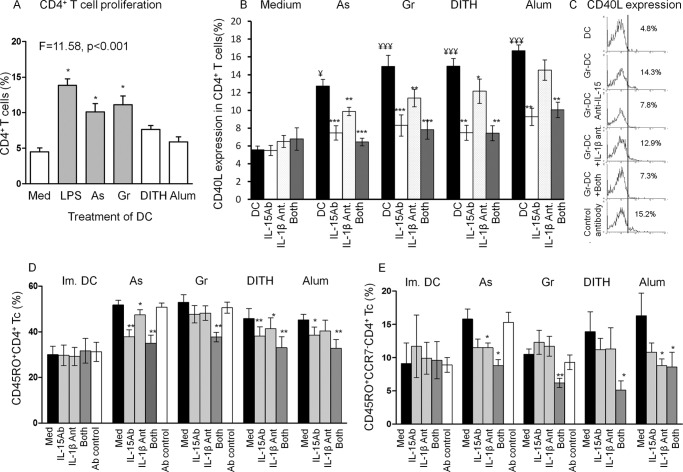FIGURE 5.
Co-culture of stress-treated DC with autologous PBMC induce CD40L and CD45RO+ memory in CD4+ T cells. These are significantly inhibited with both IL-15 antibodies and IL-1β antagonists with all stress agents. For optimum expression of human CD45RO+ or CD45RO+CCR7− memory T cells, both the homeostatic and inflammasome pathways have to be activated. To determine the role of IL-15 and IL-1β on CD40L expression in DC-PBMC co-cultures, IL-15 antibodies and IL-1β antagonist or both were added to the cultures treated with sodium arsenite (As), gramicidin (Gr), dithiocarbamate (DITH), and alum. A, CD4+ T cell proliferative responses were performed by the carboxyfluorescein succinimidyl ester method. B, CD40L expression in CD4+ T cells co-cultured with autologous DC, activated with the stress agents, and treated with IL-15 antibodies, IL-1βR antagonist or both. Similarly, isotype control antibody showed no difference from the untreated cells (data not presented). C, representative flow cytometry. Similarly the two pathways were studied for CD45RO+ memory (D) and CD45RO+CCR7− effector memory CD4+ (E) T cells inhibitions. Thus, all stress agents up-regulated CD4+ and CCR7− memory T cells and optimum inhibition resulted when both inhibition agents were used. Student's t test was used for the inhibitions against untreated cultures; *, p < 0.05; **, p < 0.01; ***, p ≤ 0.001; and those of stress treated against untreated DC: ¥, <0.05; ¥¥¥, <0.001 (n = 4); ■, DC.

